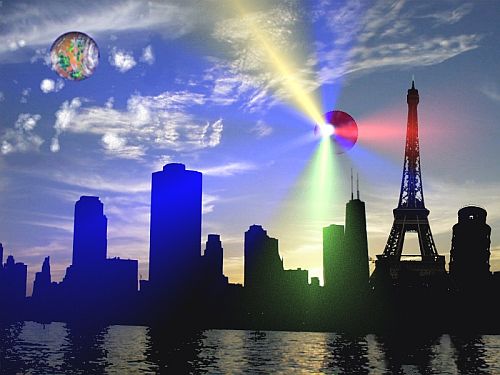The page you’re reading has been inspired by an emblematic press article, published in the month of March 2024 by the second most spread daily newspaper in Italy (the name is not important). You need to know that in Italy the vast majority of newspapers is under the control, normally indirect, of the parties belonging to political left. Well, according to the described press article, artificial intelligence was invented by a brilliant antifascist, a Norwegian-Italian psychologist and mathematician born in Rome, Mr. Nils Aall Barricelli, who in the 50’s was a researcher at the Institute for Advanced Studies in Princeton, NJ US. The article would like to represent a “scientific” demonstration that the actual government of Italy is bad for the country, because bound to fascism, and a loss of time on the path to progress. Well, I can’t appreciate the so called “castles of cards”, that are false syllogisms, based on a distortion of facts, obtained by connecting irreconcilable contexts. Thus, this page has two purposes: first, telling the main elements of the story of Nils Barricelli, without political falsifications; second, an explanation of my opinion in the matter of artificial intelligence. I have the ambition of giving a small contribution, in answering to the question whether artificial intelligence is truly intelligent or not.
Previously, the name of Nils Barricelli is mostly forgotten. Rare sources are defining him “one of the pioneers in evolutionary computation”, a sub-field of artificial intelligence. No reliable source is confirming that Nils Baricelli is the father of artificial intelligence. More precisely, Nils Barricelli published a study in the year 1954, on the topic of algorithms inspired by biological evolution. Many experts consider the study as “crazy”. However, it was utilized in the field of complex optimization, as an attempt of problem solving, focalized on trial and error. The, extremely rare, admirers of Nils Barricelli are calling him “the father of digital life”. By the way, the recognized father of artificial intelligence is Mr. Alan Turing.
Dear friend, can you define the content of intelligence? Unluckily, there are many different theories. I let my readers explore the web, in search for the theories of the above. Given that I don’t want to prolong the page, I propose my preferred notion of intelligence, as follows: intelligence is the ability of understanding, intended as learning things from perception, memorization, and elaboration of factual experiences. The notion is apparently simple, but it means something not obvious, that intelligence is made of the following elements: recognition of the duality of an ego and an external world, consciousness of complexity, casualty, and self-ignorance, sense of time, and will to establish a mutual correlation between the ego and the external world. Now, I can conclude. The expression “artificial intelligence” is paradoxical and insensate, because no machine could ever learn anything from perceiving the analogical world. With other words, computers are mere recorders of electric micro-charges, whose unique, possible outputs are electric micro-charges, without any self-generated order. Consequently, generative artificial intelligence might be a wily stratagem to infringe copyrights.
Coming to music, the mix shows that humans don’t fear machines, but other humans who exploit machines, in order to increase their personal powers, or privileges, or advantages. In effect, there’s no demon inside artificial intelligence, while there are many demons fighting to control the humans who are working on and with artificial intelligence.
File name is “robots are tools or weapons, by Max Look DJ (March 2024)”, 1 hour 23’ and 44” of electronic tracks, dedicated to the world of computers and robots.
Synthetic world, the playlist:
Thomas Leer – synthetic world (2004)
Joao Kurk – I wouldn’t want to be like you (1992)
John Williams & the London Symphony Orchestra – Star Wars, the imperial march (1997)
Kraftwerk – the man-machine (1978)
John Carpenter – the end (disco version 1983)
Basskraft – the robots (1998)
Rolf Trostel – new age of intelligence (Edward version 2018)
Hipnosis – end title (Blade Runner 1983)
Den Harrow – future brain instrumental (1985)
Koto – mind machine 12” (1992)
Message From Future – robot is … (1982)
Crash Course in Science – some change (2017)
Tangerine Dream – no man’s land (1983)
Krisma – last chance to see man (1980)
Mythos – nurse robot (1980)
Rockets – future game (1982)
Yellow Magic Orchestra – citizens of science (1980)

